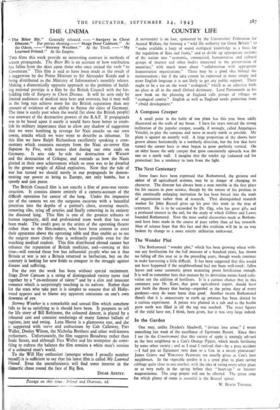THE CINEMA
" The Biter Bit." Generally released. — Surgery in Chest Disease." For private showing.—" Stage Door Canteen." At the Odeon. — " Stormy Weather." At the Tivoli. — " My Learned Friend." At the Empire.
Two films this week provide an interesting contrast in methods of screen propaganda. The Biter Bit is an account of how retribution has fallen from the skies upon those who once coined the verb " to Coventrate." This film is said to have been made as the result of a suggestion by the Prime Minister to Sir Alexander Korda and is being distributed as the Ministry of Information's monthly release.
Making a diametrically opposite approach to the problem of build- ing national prestige is a film by the British Council with the for- bidding title of Surgery in Chest Disease. It will be seen only by limited audiences of medical men here and overseas, but it may well in the long run achieve more for the British reputation than any amount of evidence of our ability to flatten the cities of Germany. The time is surely past when the world (let alone the British people) was unaware of the destructive powers of the R.A.F. If propaganda was to be based upon it surely it would have been better to estab- lish its military importance than to allow any shadow of suggestion that we were bombing iv revenge for Nazi attacks on our own towns, attacks which we were wont to describe as inhuman. In this film we have Ralph Richardson excellently speaking a com- mentary which contrasts excerpts from the Nazi air-terror film Baptism by Fire, with scenes shot during our own raids on Germany. It sets side by side the destruction of Warsaw and the destruction of Cologne, and reminds us how the Nazis gloried in their own achievement which so soon was to be dwarfed by the greater weight of Allied explosives. Now that the tide of war has turned we should surely in our propaganda be demon- strating our power to bring to Europe, not only bombs, but a speedy and just peace.
The British Council film is not exactly a film of post-war recon-
struction. It consists almost entirely of a camera-account of the difficult operation for cancer of the lung. Under the impassive eye of the camera we see the surgeons excavate with a beautiful precision into the depths of a patient's chest, severing muscle, removing ribs, tying off arteries and finally removing in its entirety the diseased lung. This film is one of the greatest tributes to human ingenuity, skill and professional team work that has ever been made. The credit goes to the artists of the operating theatre rather than to the film-makers, who have been content to erect their apparatus above the operating table and thus enable us to see the surgery more clearly than is ordinarily possible even for the watching medical student This film distributed abroad cannot but enhance the reputation of British medicine, and—coming at this time—will remind those few but influential people who see it that Britain at war is not a Britain returned to barbarism, but on the contrary is looking for new fields to conquer in the struggle against disease and suffering.
For the rest the week has been without special excitement.
Stage Door Canteen is a string of distinguished variety turns tied together by a " co-ordinator of talent " and by a slim and innocent romance which is surprisingly touching in its naivete. Rather than list the stars who take part it is simpler to assume that all Holly- wood appears and to blame any apparent omissions on one's own slowness of eye.
Stormy Weather is a remarkable and unsual film which somehow
fails to be as satisfying as it should have been. It purports to tell the life story of Bill Robinson, the coloured dancer, is played by a coloured cast and contains' renderings of many famous ballads of ragtime, jazz and swing. Lena Home is a glamorous star, and she is supported with verve and enthusiasm by Cab Calloway, Fats Waller, Dooley Wilson, the Nicholas Brothers and other well-known performers. Unfortunately, the film suggests Broadway rather than Beale Street, and although Fats Waller and his trumpeter do some- thing to redress the balance the film remains a white man's version of a coloured man's world.
To the Will Hay enthusiast (amongst whom I proudly number myself) it is sufficient to say that his latest film is called My Learned Friend. Even the unenthusiastic will find some interest in the climactic chase round the face of Big Ben.
EDGAR ANSTEY.
Postage on this issue : .Inland and Overseas, ad.


























 Previous page
Previous page